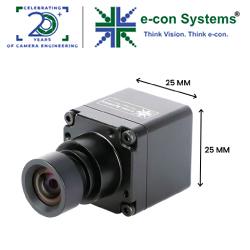Icarus Raises $6.1M Seed Round to Launch the Robotic Labor Force for Space
Icarus is working to bring embodied AI to space operations, addressing the critical labor bottleneck and has signed agreements with Voyager Space for ISS deployment and future Starlab operations
September 17, 2025 - [New York, NY] - Icarus, the robotics company building the general-purpose robotic labor force for space, announced the completion of a $6.1 million seed round. The company is applying embodied AI to space operations, creating human-controlled robots that can then learn and scale across the full spectrum of space labor.
Icarus was founded by Ethan Barajas, a mechanical engineer who began designing nanolabs for NASA and the ISS in high school and later worked on lunar rovers with NASA while studying at Caltech, and Jamie Palmer, who brings robotics expertise from Columbia's ROAM lab and high-performance engineering experience from the Mercedes-AMG Petronas Formula One Team.
The round was led by Soma Capital (Rippling, Deel) and Xtal, with additional investment from Nebular and Massive Tech Ventures, among others.
As the space economy enters an explosive growth phase, with telecom infrastructure like Starlink, commercial space stations, lunar bases, and even Mars missions on the horizon, it's clear that labor has become its most pressing bottleneck. Less than 100 astronauts are active at any given time globally, and much of their time is spent on mundane tasks, such as cargo handling and equipment checks. Existing space robotics relies on rigid, pre-programmed systems that must be redesigned for every new use case.
Icarus is bringing general-purpose robots, eventually controlled by embodied AI, or robots with built-in intelligence that can physically interact with their environment, into space. These robots are designed to take on the full range of space labor, starting with intra vehicular activities (IVA), or tasks performed inside a spacecraft, and eventually scaling to large-scale orbital construction, such as maintaining satellites or infrastructure in space. Icarus's first-generation robots are operated remotely by humans — a first step toward embodied AI: machines that learn from human demonstrations and eventually carry out complex space tasks autonomously.
"We're asking hundred-thousand-dollar-an-hour talent to do warehouse work in space -- and millions more to transport them there, all paid for by taxpayers," said Icarus CEO Ethan Barajas. "Our robots start by learning from human demonstrations, then handle the repetitive work while astronauts focus on discoveries only humans can make.
Unlike traditional AI, which exists purely in digital environments, embodied AI integrates intelligence into physical systems that learn through real-world interaction. Icarus has already built multiple prototypes, demonstrated coast-to-coast teleoperation with near-zero latency, and secured partnerships with NASA and major commercial space station developers.
"Every major robotics company on Earth is using embodied AI to create adaptable, learning robots, but space is still using control methods from the 1980s," said Jamie Palmer, Co-Founder and CTO. "We're not just putting robots in space, we're bringing the robotics revolution to space operations through systems that learn from human expertise."
Icarus's approach represents a dramatic departure from how space robotics currently operates. Space robotics is stuck in an approach that is rigid, pre-programmed, and impossible to scale. Icarus is breaking that mold with robots that learn, adapt, and evolve alongside the growing demands of space infrastructure.
"We're excited to back the Icarus team as they solve one of the most critical bottlenecks in the space economy," said Aneel Ranadive, Founder and Managing Partner of Soma Capital. "As commercial space manufacturing moves to orbit, Icarus is positioned to capture significant value by freeing astronauts from routine tasks for high-leverage research and exploration."
While embodied AI is already transforming robotics on Earth, through systems trained on human demonstrations, Icarus is the first to bring this breakthrough to space operations.
Icarus's robots begin with human-in-the-loop control to gather training data, then take on more autonomy as the system learns. This approach enables faster deployment, safer operations, and a scalable labor force for environments too remote or hazardous for direct human presence.
Labor drives half of Earth's GDP, and space will be no different. Icarus is building the infrastructure to power the trillion-dollar space economy.
About Icarus
Icarus is building the robotic labor force for space through general-purpose robotic systems powered by embodied AI. Founded in 2024 and headquartered in New York, the company is one of the first working to bring embodied AI to space operations, creating human-controlled robots that learn from demonstrations and scale across space labor tasks. Starting with commercial space stations and expanding to orbital construction and infrastructure maintenance, Icarus enables astronauts to focus on high-value research instead of routine work.
Ethan Barajas, Co-Founder and CEO, began his career at the age of 17 with a NASA internship, where he worked on autonomous plant growth on the ISS—a project he continued for several years and became one of the youngest technical presenters at the ISS R&D Conference. He studied Mechanical Engineering at Caltech under NASA JPL professors and researchers, contributing to next-generation lunar rover development.
Jamie Palmer, Co-Founder and CTO, earned his Master's in Robotics from Columbia University on a full scholarship, researching intelligent, dexterous manipulation in the ROAM lab. He developed and deployed autonomous hospital robots during the pandemic and worked as a race-winning engineer for the Mercedes-AMG Petronas Formula One team.
Backed by Soma Capital, Xtal, Nebular, and Massive Tech Ventures, among others, Icarus is advancing rapidly through a tight iteration cycle and flight-ready testing.
Featured Product

3MP HDR IP69K Camera for Robotics & Autonomous Vehicles
STURDeCAM31 from e-con Systems® is designed to make robotics and autonomous vehicles safer and more reliable. Powered by the Sony® ISX031 sensor and featuring GMSL2 interface, this compact 3MP camera delivers 120dB HDR + LFM imaging with zero motion blur — even in the most challenging outdoor conditions. Engineered to automotive-grade standards, STURDeCAM31 is IP69K certified, making it resistant to dust, water, vibration, and extreme temperatures. With support for up to 8 synchronized cameras, it enables powerful surround-view and bird's eye systems on NVIDIA® Jetson AGX Orin™.
